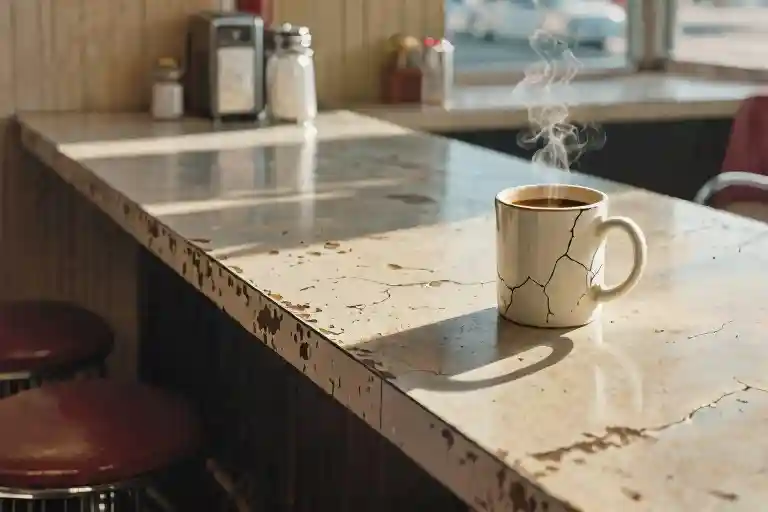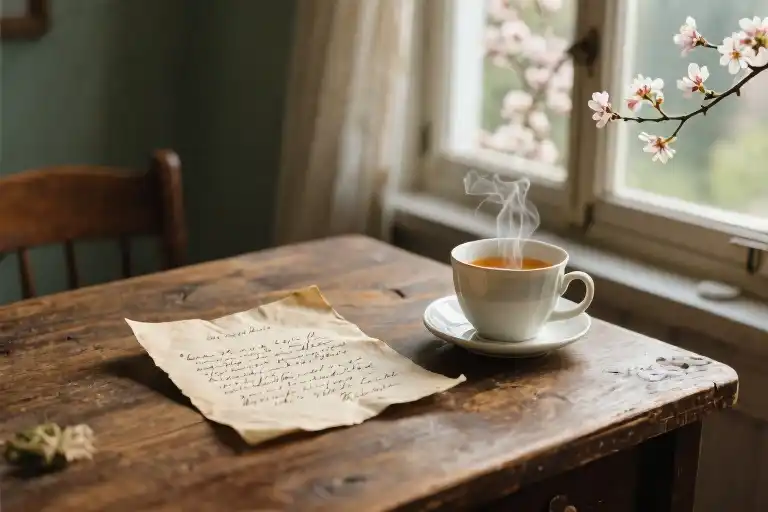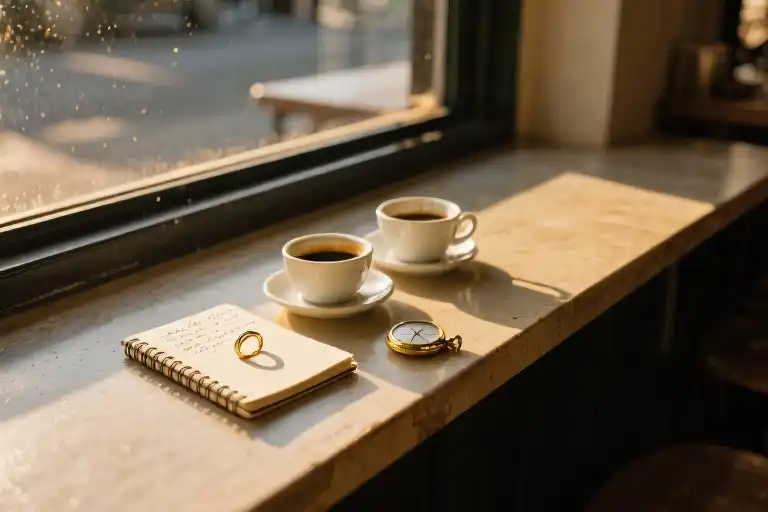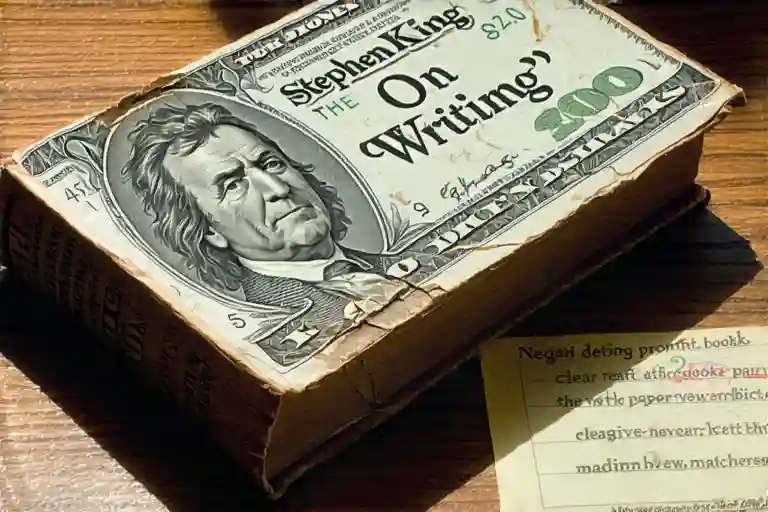The old man’s fingers trembled slightly as they traced the rim of his coffee mug. Steam curled upward in delicate spirals, vanishing before it reached his weathered face. ‘My older brother once pulled the chair out as our mother was about to sit,’ he said, his voice carrying the weight of decades in its quietness. The words hung between us like the diner’s perpetual smell of bacon grease and maple syrup.
Across the Formica counter, I froze with the coffee pot still tilted. ‘That’s terrible. Why did he do that?’ The question escaped before I could measure it, one of those automatic responses we make when confronted with childhood cruelty.
He didn’t answer. Instead, his eyes – the pale blue of faded denim – drifted past me to the window where palm fronds sketched arcs against the morning sky. There was something hypnotic about their movement, the way they swayed without breaking, rooted yet constantly in motion. They reminded me of Mrs. Calloway’s metronome from piano lessons, that relentless pendulum that never cared whether I’d mastered my scales.
But this was different. The palms’ rhythm didn’t soothe the old man. His shoulders remained rigid beneath his plaid shirt, as if bracing against some invisible storm. The newspaper spread before him bore yesterday’s headlines, the ink slightly smudged where his thumb had worried at a corner.
I glanced at the laminated menu wedged beside his elbow. ‘Would you like to order anything from the kitchen?’ The words felt inadequate, but what does one say to a stranger’s sudden confession?
‘Have you got any mulligans?’ His gaze snapped back to mine, sharp as the crack of a nine-iron.
‘Excuse me?’
‘Do you play golf, son?’ He exhaled through his nose, a sound halfway between a sigh and a chuckle. When I shook my head, he continued, ‘Mulligans are second chances. Opportunities to take another shot.’ His fingers resumed their journey around the mug’s circumference. ‘Have another go.’
Outside, the palms kept time with some silent music, their shadows stretching across the vinyl floor like elongated fingers reaching for something just out of grasp.
The Fracture in Memory
The old man’s fingers trembled slightly as they traced the edge of a photograph hidden beneath his frayed sleeve. That small movement betrayed more than his words ever could – a lifetime of compressed emotions pressing against the dam of his composure.
‘He was always like that, my brother,’ he murmured, not to me but to some invisible listener between us. ‘Never missed a chance to make others look foolish.’ The coffee in his mug had stopped steaming, but he didn’t seem to notice. His eyes focused on something decades away.
I saw the scene unfold as if watching through warped glass – a sunlit kitchen where a younger version of this man stood frozen in the doorway. His brother’s laughter bounced off checkered linoleum as their mother fell backward, her arms flailing for balance that wouldn’t come. The sickening crack of bone meeting tile. Then silence, heavy as wet wool.
‘Did she…?’ I began, but the question dissolved in my throat. The old man’s jaw worked silently, tendons standing out like bridge cables. His thumb kept rubbing that hidden photograph through the thin fabric, wearing the memory smooth at the edges.
Outside, the palm fronds continued their indifferent dance. Inside, time had crystallized around that single moment – the prank, the fall, the unspoken aftermath. Some fractures never truly heal; they just learn how not to bleed where people can see.
When he finally spoke again, his voice carried the weight of folded letters kept too long in drawers. ‘She never sat without checking after that.’ His hand stilled. ‘Neither did I.’
The Irony of Nature
The old man’s fingers trembled slightly as they traced the rim of his coffee mug, his knuckles pale against the ceramic. Outside, the palm trees continued their endless dance, fronds brushing against each other with a sound like distant applause. There was something almost mocking about their carefree movement – these trees anchored yet swaying, while the man sat perfectly still, bound by invisible chains.
I slid the laminated menu across the table, its edge nudging against his newspaper. ‘Would you like to order anything from the kitchen?’ The question hung between us, heavier than it should have been.
His eyes, when they finally lifted from the coffee stains on the newsprint, held a peculiar intensity. ‘Have you got any mulligans?’ The word landed strangely in the quiet cafe, out of place among the usual requests for pancakes and refills.
‘Excuse me?’ I could feel my forehead crease in confusion.
‘Do you play golf, son?’ His voice had taken on a patient quality, the way one might explain something to a child.
‘Uh, no sir.’
A sigh escaped him, carrying decades of unspoken stories. ‘Mulligans are second chances. Opportunities to take another shot. Have another go.’ His gaze drifted back to the window where those damn palm trees kept swaying, indifferent to human regrets.
On the counter near us, a spoon slipped from a saucer with a sharp clatter. The old man didn’t flinch. He was watching the trees with the focus of a man trying to memorize something before it disappeared forever. Their shadows made shifting patterns across his face, like fleeting memories he couldn’t quite grasp.
I suddenly understood why the sight of them bothered me. Their movement wasn’t peaceful – it was relentless. However much they bent, they always returned to center, unchanged. No matter how violently the wind pulled at them, they remained fundamentally the same trees. There was no mulligan for a palm tree, no do-over for its growth rings or the direction of its trunk.
The old man’s coffee had gone cold. A thin skin had formed on the surface, like ice on a winter pond. He made no move to drink it.
The Weight of Metaphors
The old man’s fingers trembled slightly as they traced the rim of his coffee mug. ‘Mulligans,’ he repeated, as if tasting the word. ‘In golf, it’s when you get to take a shot again. No penalty.’ His voice carried the roughness of someone who hadn’t spoken much in years, each word carefully excavated from some deep place.
I wiped my hands on my apron, unsure how to respond. The diner’s fluorescent lights hummed overhead, casting sharp shadows across the newspaper he’d been pretending to read. Outside, those same palm trees continued their endless swaying, indifferent to our conversation.
‘Some roots can’t be pulled out,’ he said suddenly, with a laugh that sounded more like a cough. His eyes flickered toward the window where the palms bent under a gust of wind. For a moment I thought he might explain – about the chair, the brother, whatever memory had surfaced when he mentioned second chances. But he just turned his coffee cup a quarter turn clockwise, the ceramic scraping against the Formica counter.
The silence stretched between us, filled only by the hiss of the espresso machine and the distant clatter of dishes. I noticed how his right hand kept flexing unconsciously, the knuckles swollen with arthritis or perhaps decades of gripping something too tightly – a golf club, a steering wheel, a brother’s collar.
‘Would you…’ I hesitated, then gestured to the nearly empty mug. ‘More coffee?’ It was the only offering I could make that didn’t require understanding what we’d really been talking about. The old man studied me for a long moment before nodding, pushing the cup forward with both hands as if surrendering something precious.
As I refilled it, the steam rising between us, I wondered about all the unspoken mulligans people carry – the moments we replay differently in our heads, the words we wish we’d said or hadn’t. The old man’s newspaper lay open to the sports section, a golf tournament circled in faint pencil. Outside, the palms kept time with their silent metronome rhythm, measuring out chances taken and lost.
The palms still swayed outside the window, their fronds tracing lazy arcs against the blue sky. The old man’s coffee had gone cold, the cream forming a wrinkled skin across the surface. He didn’t seem to notice, his fingers absently tracing the rim of the mug where a small chip had been worn smooth over time.
I wiped my hands on my apron, unsure whether to refill his cup or leave him to his thoughts. The newspaper lay forgotten beside his elbow, yesterday’s headlines curling at the edges. A breeze slipped through the half-open window, carrying the scent of salt and gasoline from the waterfront three blocks away.
‘Can I get you anything else?’ I asked, more out of habit than expectation.
His eyes remained fixed on some point beyond the glass, beyond the palms, perhaps. The silence stretched long enough that I began backing away, the rubber soles of my shoes squeaking against the linoleum.
Then, just as I turned toward the kitchen, I heard it – the quietest sound, like a sigh or maybe a word caught in his throat. When I looked back, he was staring at the empty chair across from him. Not the one I’d nearly taken earlier, but the other one, the one that had remained vacant all morning.
Outside, a seagull cried. The palms kept swaying. The clock above the register ticked past noon.
I left him there with his cold coffee and his ghosts, walking back to the counter where new customers waited. Behind me, the chair creaked as he finally stood, the newspaper rustling as he folded it with deliberate care. He left exact change on the table, the coins arranged in a perfect line beside the saucer.
The bell above the door jingled twice – once when it opened, once when it closed. Through the window, I watched him walk away, his shadow stretching long across the sidewalk until it disappeared around the corner where the palms couldn’t reach.





